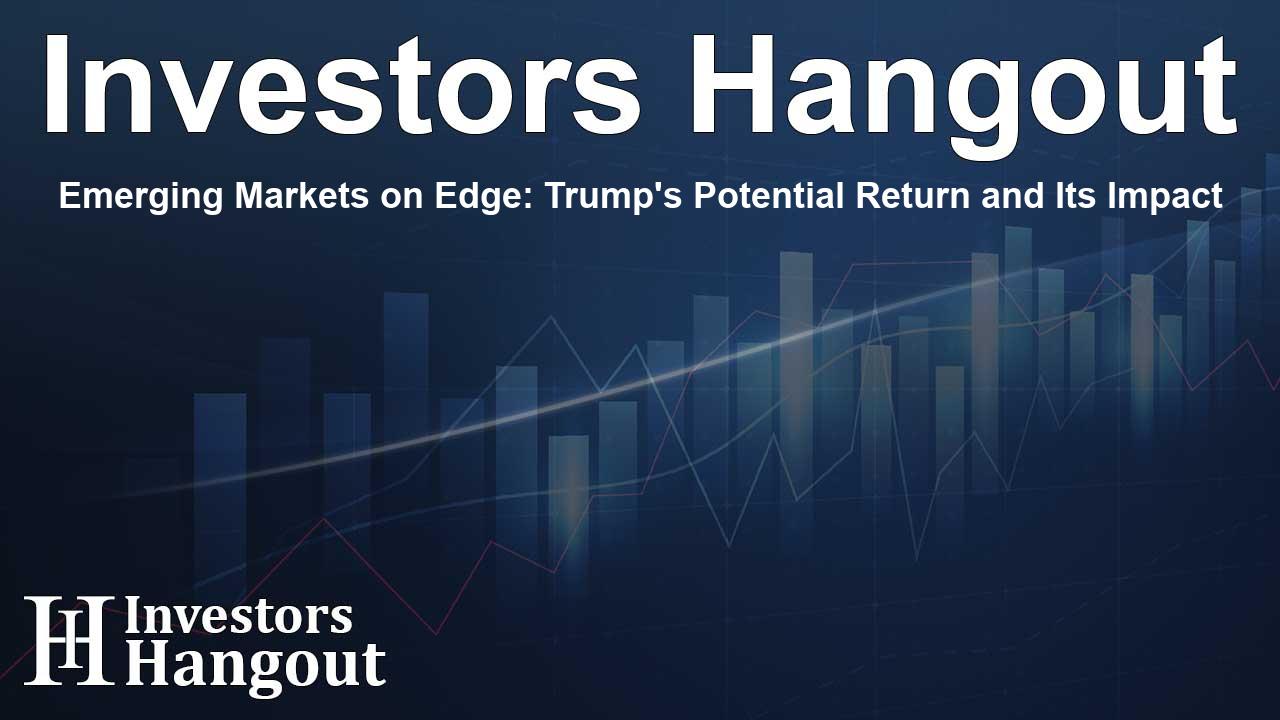Emerging Markets on Edge: Trump's Potential Return and Its Impact

Emerging Markets in a State of Uncertainty
The current situation in the U.S. with ongoing presidential election dynamics has cast a shadow over emerging market investors. Uncertainties regarding the potential return of former President Donald Trump are raising alarms, particularly about how his second term could affect market stability and growth opportunities for emerging economies.
Interest Rates and Economic Outlook
Despite optimistic outlooks fueled by potential decreases in interest rates, concerns loom. The anticipated lower interest rates in the U.S. have led to expectations of a more favorable environment for emerging market (EM) assets. Nevertheless, the fear of Trump reinstating trade barriers have investors on edge, as such measures could lead to inflation spikes and subsequent interests rate hikes, potentially disadvantageous for emerging markets attempting to gain traction.
According to Arun Sai, a senior strategist at Pictet Asset Management, the backdrop seems supportive for emerging markets due to resilient growth and a discernible weak dollar. However, he emphasizes two pivotal challenges: the sluggishness of the Chinese economy and the looming threat of increased tariffs on global trade.
Potential Trade Barriers
Trump's stance on tariffs remains an issue of great concern. His statement regarding the possibility of imposing 60% tariffs on Chinese exports could drastically impact global trade, potentially reducing China's GDP significantly. Such trade restrictions could redirect and severely hinder U.S.-China trade, leading to considerable losses on both sides, according to analyses by leading economists.
Manish Bhargava, CEO of Straits Investment Management, expressed the difficulty in predicting any recovery in China's economy. He pointed out that while there are attractive opportunities in markets like India, the current costs are high, and China presents its own set of challenges.
Political Landscape and Future Implications
During the recent political debates, Democratic candidates emphasized the ramifications of tariffs. Kamala Harris criticized the implications of Trump's tariff strategies while suggesting alternative approaches, including investment in renewable sectors alongside tariffs. If Harris takes the lead, her administration might adopt a balanced approach using tariffs judiciously, aiming for strategic growth through clean energy investments.
A Silver Lining Amidst Challenges
Even with these potential hurdles, there are experts who perceive silver linings. According to Mark Haefele from UBS Global Wealth Management, while some tariffs may be proposed, they could be lower than initially projected. Additionally, the concept of 'friendshoring'—shifting supply chains to more cooperative countries—could serve emerging markets aligned with the U.S. to thrive.
Opportunities in India and Southeast Asia
Countries like India, along with Southeast Asian nations such as Indonesia and Malaysia, may see benefits if businesses diversify their supply chains in response to geopolitical pressures. India's growth narrative is attractive, fueled by a supportive government, favorable demographics, and the opportunity from trends like the China+1 strategy, which encourages companies to consider alternatives to reliance on China.
Conclusion
The interplay of U.S. politics and global trade remains complex, with the potential for significant implications for emerging markets. As investors navigate these uncertainties, they will need to remain vigilant to adapt to evolving scenarios in the U.S. and international economic landscape. Understanding these dynamics is essential for making informed decisions in a potentially shifting environment.
Frequently Asked Questions
What are emerging markets?
Emerging markets are nations with social or business activity in the process of rapid growth and industrialization, often characterized by lower-than-average income levels and market volatility.
How does U.S. politics affect emerging markets?
Decisions made in U.S. politics, such as trade policies and tariffs, can influence global economic conditions and impact emerging markets by altering trade dynamics and capital flows.
What is 'friendshoring'?
Friendshoring is a strategy where supply chains are moved away from countries that are seen as potential geopolitical risks to more trusted or allied nations.
Will a return of Trump impact inflation rates?
A Trump presidency might lead to higher tariffs, which could spur inflation due to increased costs for imported goods, influencing overall price levels in the economy.
What opportunities exist for India in the current market?
India stands to benefit from demographic advantages, long-term growth potential, and its strategic position in the supply chain diversification trends, making it an attractive market for investment.
About The Author
Contact Caleb Price privately here. Or send an email with ATTN: Caleb Price as the subject to contact@investorshangout.com.
About Investors Hangout
Investors Hangout is a leading online stock forum for financial discussion and learning, offering a wide range of free tools and resources. It draws in traders of all levels, who exchange market knowledge, investigate trading tactics, and keep an eye on industry developments in real time. Featuring financial articles, stock message boards, quotes, charts, company profiles, and live news updates. Through cooperative learning and a wealth of informational resources, it helps users from novices creating their first portfolios to experts honing their techniques. Join Investors Hangout today: https://investorshangout.com/
The content of this article is based on factual, publicly available information and does not represent legal, financial, or investment advice. Investors Hangout does not offer financial advice, and the author is not a licensed financial advisor. Consult a qualified advisor before making any financial or investment decisions based on this article. This article should not be considered advice to purchase, sell, or hold any securities or other investments. If any of the material provided here is inaccurate, please contact us for corrections.
